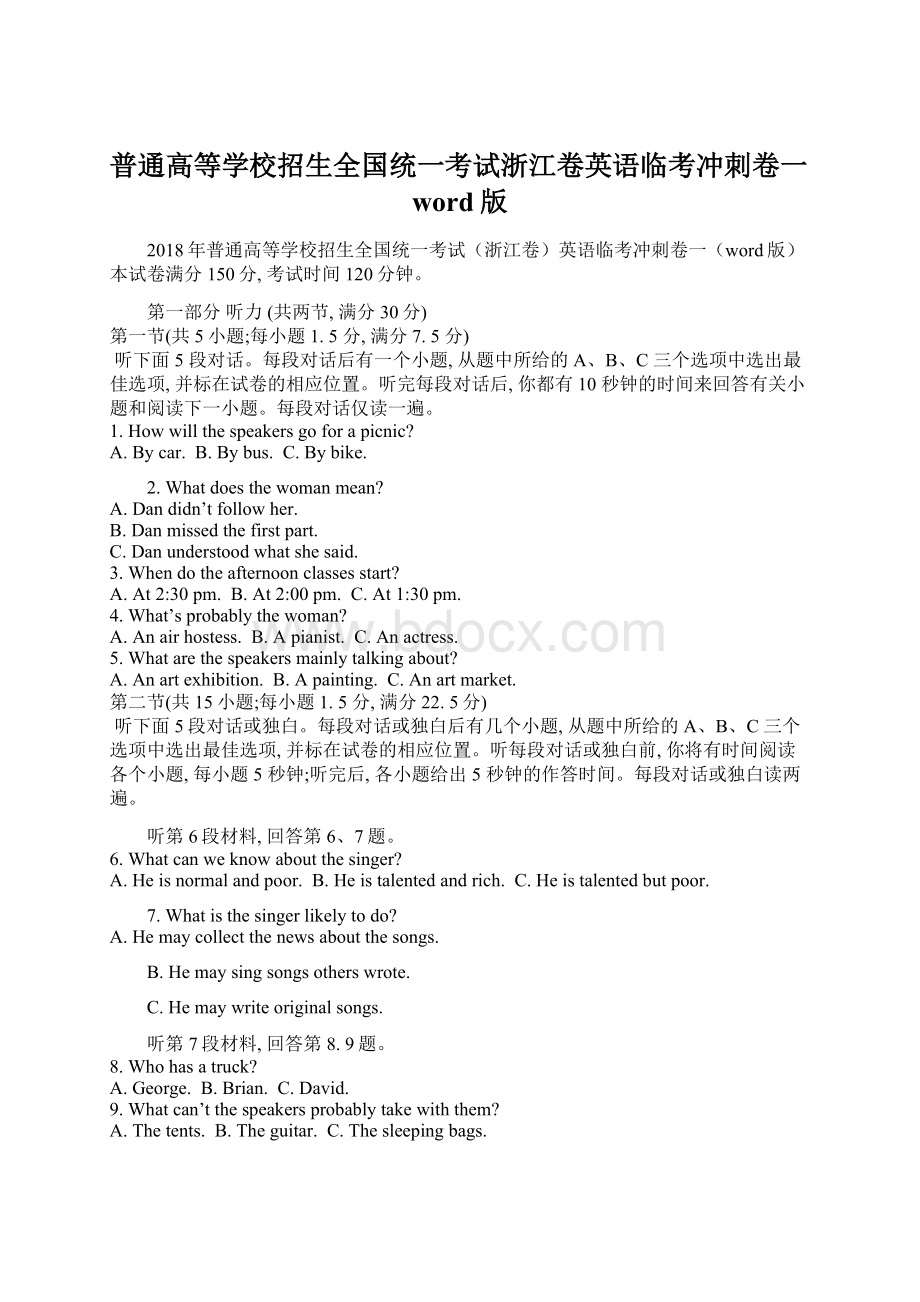普通高等学校招生全国统一考试浙江卷英语临考冲刺卷一word版Word文档下载推荐.docx
《普通高等学校招生全国统一考试浙江卷英语临考冲刺卷一word版Word文档下载推荐.docx》由会员分享,可在线阅读,更多相关《普通高等学校招生全国统一考试浙江卷英语临考冲刺卷一word版Word文档下载推荐.docx(11页珍藏版)》请在冰豆网上搜索。

woman
mean?
A.Dan
didn’t
follow
her.
B.Dan
missed
first
part.
C.Dan
understood
what
she
said.
3.When
do
afternoon
classes
start?
A.At
2:
30
pm.B.At
00
pm.C.At
1:
pm.
4.What’s
probably
woman?
A.An
air
hostess.B.A
pianist.C.An
actress.
5.What
are
mainly
talking
about?
art
exhibition.B.A
painting.C.An
market.
第二节(共15小题;
分,满分22.5分)
听下面5段对话或独白。
每段对话或独白后有几个小题,从题中所给的A、B、C
听每段对话或独白前,你将有时间阅读各个小题,每小题5
秒钟;
听完后,各小题给出5
秒钟的作答时间。
每段对话或独白读两遍。
听第6段材料,回答第6、7题。
6.What
can
we
know
about
singer?
A.He
is
normal
and
poor.B.He
talented
rich.C.He
but
poor.
7.What
singer
likely
to
do?
may
collect
news
songs.
B.He
sing
songs
others
wrote.
C.He
write
original
听第7段材料,回答第8.9题。
8.Who
has
truck?
A.George.B.Brian.C.David.
9.What
can’t
take
with
them?
A.The
tents.B.The
guitar.C.The
sleeping
bags.
听第8段材料,回答第10
至12题。
10.What
think
of
moon
cake?
A.It’s
round
looks
like
full
moon.
B.It
stands
reunion.
C.People
put
lots
oil
sugar
in
it.
11.Where
conversation
place?
A.In
food
processing
factory.B.In
store.C.In
hotel.
12.What
get
at
last?
A.Some
Cantonese-style
cakes.
B.Some
Suzhou-style
C.Moon
cakes
both
styles.
听第9
段材料,回答第13
至16
题。
13.What
Roger
Sabata?
some
shopping
food.
ways
on
diet.
lot
research
14.What’s
biggest
change
eating
habits?
amount
out.B.The
nutrition
food.C.The
types
15.What
people’s
habits
nowadays?
old
eat
out
more
often.
parents
never
fast
C.Teenagers
often
16.What’s
drinking
preference
now?
A.Drinking
milk.B.Drinking
soda.C.Drinkingmorewater.
听第10段材料,回答第17至20题。
17.Whendoesthespeakerpreparethesoil?
A.Inspring.B.Insummer.C.Inwinter.
18.Whydoesthespeakerplantsmallplantsinsteadofseeds?
A.Theyarecheap.B.Theygrowquickly.C.Theyhaveagoodstart.
19.Howdoesthespeakerhelpplantsdeveloproots?
A.Bywateringtheplants.
B.Byfertilizingtheplants.
C.Bydiggingasmallholearoundthem.
20.Whatdotheyusetoplowtheoldplantsunder?
A.Atiller.B.Ahook.C.Aplowshare.
第二部分阅读理解(百强校英语解析团队专供)(共两节,满分35分)
第一节(共10小题;
每小题2.5分,满分25分)
阅读下列短文,从每题所给的A、B、C和D四个选项中,选出最佳选项。
A
Overtheweekend,theNewYorkTimespublishedastoryannouncingthedeathofvoicemails,quotingaVonagespokespersonwhosaidthatvoicemailusehaddecreased8percentfromlastOctobertoAprilofthisyear.Thestorypositionsmillennials(千禧一代)asbeingprimarilyresponsible,asthetext-preferringgenerationhaslittlepatienceforsittingthroughalong,droningmessage.
Butthere’sanotherelementhere:
awkwardness.AMothStorySLAM—winnerKateGreatheadoncesaid,“I’mfinewhentellastoryinfrontof400strangers,butgetdry-mouthedwhenleavingavoicemail.”“Inasense,leavingavoicemailinvolveseverythingwefearaboutpublicspeaking-withtheaddeddiscomfortofreceivingabsolutesilencefromyouraudienceinanemail,”saidJoshuaClegg,apsychologistatCUNY’sJohnJayCollegeofCriminalJustice.Thespotlightisonyou,whichcanbepanic-inducingenough.Butinamoretraditionalpublicspeaking,atleastyougetfeedbackfromyouraudience,whichmeansyougetachancetoadapttothatresponseandpotentiallyrecoverfromanymissteps.Butitisn’tsowiththevoicemail.
InanexperimentCleggaskedparticipantstogetinvolvedinanimpromptu(即兴的)defenseoftheiropinionsonagiventopic.Theywereallaloneandtheywerebeingfilmed.“Itwaslikeatortureformostofthem,andmanyofthemweresweating,fidgeting,lookingattheground,tongue-tied,”hesaid.“Someofthemevenhadtoquitinthemiddlebecauseitwastoodifficultforthem.”
“Ofcourse,thingsseemtobecomelessawkwardwhentheyarefamiliar,butthevoicemailseemstobeonitswayoutsothereislittlepointingettinggoodatit.”headded.Thereyouhaveit:
permissionfromascientisttoavoidleavingvoicemailsandawaitthedaywhenthesystemdiesanaturaldeath.
21.Whydon’tmillennialslikevoicemails?
A.Becauseleavingvoicemailsusuallymakesusersfeelawkward.
B.Becausesomenewmeansofcommunicationhavebeeninvented.
C.Becausetheythinkotherswillhackintothevoicemail.
D.Becausetheyareimpatientwithalongandnoisymessage.
22.HowmightKateGreatheadfeelwhenleavingavoicemailaccordingtoParagraph2?
A.Undistracted.
B.Uncomfortable.
D.Confused.
23.Theauthorexplains“awkwardness”whenleavingavoicemailmainlyby.
A.makingacomparison
B.usingexamples
C.presentingresearchfindings
D.givingadefinition
24.Whatisheauthor’sopiniononvoicemails?
A.Millennialsaretoblameforthedecreaseofvoicemails.
B.Leavingvoicemailsismoredifficultthanpublicspeaking.
C.Voicemailswilldisappearnaturally.
D.Themoreyouarefamiliarwithonesyouspeakto,thelessawkwardyou’llfeel.
B
Thefiremenwereback.“Let’stakeyoutheretohavealook.”Sweetblacksmokestillhungintheair.Myhallwascoveredinblackruins.Mykitchenwasalmostgone:
thecooker,thefridge,thewashing-machineandtheceilinginpiecesbythedoor.“Itcouldhavebeenworse,”saidthefireman,aphraseheardalotinthelastfewdays.Ithankedhimforgettingtheresoquickly.“We’renotthepolice,youknow.”helaughed.
Iphonedafriendatwork,butherll-year-oldson,Oliver,wasthere.“There’sbeenafire,um,canwecomeandstay?
”
“Afire?
Wow,great,seeyou.”
Iarrivedwithtwokidsandbagsfullofsmellyclothesbytaxi.Myfriendspenttheweekendfeedingmeandtellingmeeverythingwouldbeallright.Wewentbacktotheflattoexaminethedestruction.Everythingwascoveredinalayerofthickblackdust.
Severaldayslater,Istartedtofeelverystrange.OnedayIhadaflat,thenextdayIdidn’t.ItriedtocheermyselfupbythinkingthatIwouldbegettingChristmasgifts—alotofnewshinykitchenappliances.AndIhavebeentoldbytheinsurancecompanywhocameandinspectedthedamage.“Itcouldhavebeenworse,”theysaid.
Returningtomy“newhome”mydaughterpresentedmewithapictureshehaddrawn,apictureofahouseonfire.Ihadtolaugh.ButasIwaslaughingIcaughtthatsmellagain.Ijustcan’tseemtogetridofit.EverywhereIgo,Icansmellsomethingburning.
25.Wheredidtheauthorprobablystayafterthefire?
A.Inanotherflat.
B.Atherfriend’shome.
C.Inashelter.
D.Atahotel.
26.Whatdoestheunderlinedsentencemeaninthefirstparagraph?
A.Thefiremancorrectedtheauthor’scomment.
B.Thefiremanwasconfidentofhisjob.
C.Thefiremanperformedhisdutymorequicklythanthepolice.
D.Thefiremanwaslaughingattheauthor.
27.Accordingtothepassage,whichofthefollowingisNOTtrue?
A.Theauthorwasluckyenoughthatonlythekitchenwasburned.
B.Peopletriedtocheertheauthorupafterthefire.
C.PeoplewouldprobablysendkitchenappliancestotheauthoratChristmas.
D.Afterthefire,somethingwentwrongwiththeauthor’snose.
C
Shockingnewsmakesheadlinesallthetime.ExamplesincludeSouthKorea’spresidentialscandalandthePope(教皇)supportingDonaldTrump.Butthedifferencebetweenthetwoisthattheformeractuallyhappened,whilethelatterisfake.Andalthoughit’sfake,the“PopesupportsTrump’newswassharedover960,000timesonFacebook.Thistrulyworriedtheworld.
Butthiswasonlyoneofmanycasesinwhichpeoplehavefallenforinaccurateinformation.AndaccordingtoDavidRapp,aprofessoratNorthwesternUniversity,US,thishaslesstodowithpeople’signorance(无知)andmoretodowithhowthehumanbrainworks.
Rappfoundthatwhenpeopleseeapieceofnews,theytendtoquickly“download”theinformationintotheirmemorybecauseit’seasierthancheckingitfirst.“We’rebombarded(轰炸)withtonsofinformationallday.It’sanightmaretoevaluateallofit,”RapptoldScienceDaily.Andjustasfirstimpressionsarehardtochange,theincorrectinformationgetsstuckinourmemory,evenifwelaterreadotherwise.Whenthebraintriestopullupinformationlater,theincorrectinformationislikelytocometomindmoreeasilythanthecorrection.“Justbecauseyoucanrememberwhatsomeonesaiddoesn’tmakeittrue,”addedRapp.
Butourbrainsonlyexplainthepsychologicalsideofthings.Thewaynewsspreadsonsocialmediahasalsoaddedtotheproblem.Earlierstudiesfoundthatpeopletendtobefriendthosewhoare“like-minded”onsocialmedia.WebsiteslikeFacebookalsousealgorithms(程序算法)tofigureoutpreferencesofusersinordertofeedthemwhattheyliketosee.Bothhavehelpedcreatewhatresearcherscalledan“echochamber”—aspacewhereonlysimilaropinionsspreadaroundwhilethingsthatareuncomfortableorchallengingarekeptoutside.
“Thedangerhereisthatyouincreasinglyendupnotseeingwhatpeoplewhothinkdifferentlysee,andinfactnotevenknowingthatitexists,”EliPariser,CEOofUpworthy,aUS-basedn